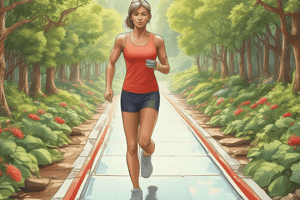Podcast
Questions and Answers
What is the main physiological issue in Type 1 diabetes?
What is the main physiological issue in Type 1 diabetes?
- High blood glucose levels only
- Absolute deficiency of insulin (correct)
- Relative insulin deficiency
- Impaired insulin action
Exercise is safe for individuals with Type 2 diabetes if their blood glucose level is above 14 mmol/L, even if ketones are present.
Exercise is safe for individuals with Type 2 diabetes if their blood glucose level is above 14 mmol/L, even if ketones are present.
False (B)
List two chronic complications of diabetes.
List two chronic complications of diabetes.
Retinopathy, neuropathy
Individuals with diabetes should monitor their blood glucose levels ____ before, during, and after exercise.
Individuals with diabetes should monitor their blood glucose levels ____ before, during, and after exercise.
Match the following diabetic conditions to their symptoms:
Match the following diabetic conditions to their symptoms:
Which of the following is a symptom of severe hypoglycemia?
Which of the following is a symptom of severe hypoglycemia?
Insulin resistance is a characteristic of Type 1 Diabetes.
Insulin resistance is a characteristic of Type 1 Diabetes.
What is the first step in managing a hypoglycemic attack?
What is the first step in managing a hypoglycemic attack?
In case of unconsciousness during a hypoglycemic attack, administer __________ and call emergency services.
In case of unconsciousness during a hypoglycemic attack, administer __________ and call emergency services.
Match the type of diabetes with its characteristics:
Match the type of diabetes with its characteristics:
Flashcards
What is diabetes?
What is diabetes?
Diabetes is a condition where the body is unable to regulate blood sugar levels effectively due to a lack or resistance to insulin.
What is Type 1 diabetes?
What is Type 1 diabetes?
Type 1 diabetes is caused by the body's immune system attacking and destroying insulin-producing cells in the pancreas, leading to an absolute lack of insulin.
What is Type 2 diabetes?
What is Type 2 diabetes?
Type 2 diabetes is characterized by either a resistance to insulin's effects or a relative deficiency in insulin production. This means the body doesn't utilize insulin effectively or doesn't produce enough.
What is Hypoglycemia?
What is Hypoglycemia?
Signup and view all the flashcards
What is Diabetic Ketoacidosis (DKA)?
What is Diabetic Ketoacidosis (DKA)?
Signup and view all the flashcards
Hypoglycemia
Hypoglycemia
Signup and view all the flashcards
Insulin
Insulin
Signup and view all the flashcards
Type 1 Diabetes
Type 1 Diabetes
Signup and view all the flashcards
Type 2 Diabetes
Type 2 Diabetes
Signup and view all the flashcards
Glucose Uptake
Glucose Uptake
Signup and view all the flashcards




